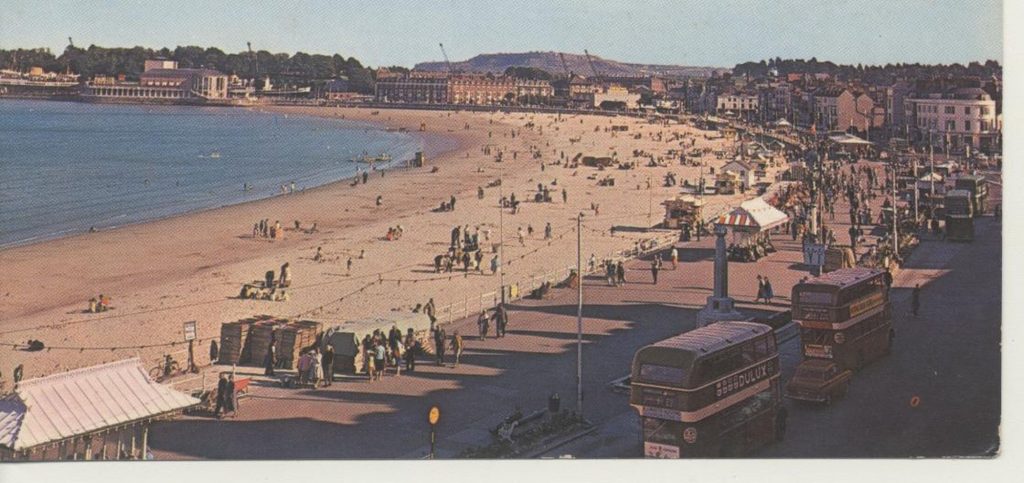
1. Concorde enters service
On January 21st 1976 a British Airways Concorde took off from London Heathrow airport with a full compliment of passengers destined for Bahrain, while at the exact same time Air France’s maiden Concorde flight left the runway at Paris’ Orly airport for Rio de Janeiro. After initially having been refused permission to fly to any destination in the USA following local concerns about noise pollution, services to Washington were announced later that year and both airlines simultaneously began services into Dulles airport on May 24th, which would operate three times per week. A new era of supersonic air transport had begun.
2. Britain wins the Eurovision Song Contest
Brotherhood of Man were a mixed, four-piece combo – two men, two ladies – who had already enjoyed chart success with their hit song United We Stand in 1973. Having been selected to represent the United Kingdom at the Eurovision Song Contest in February 1976, the group’s catchy little number Save Your Kisses for Me proved a big hit with the judges and few were surprised when it was declared the winner, the first time the UK had clinched the prize outright since Sandie Shaw’s Puppet On a String in 1967.
3. John Curry wins gold at the Winter Olympics
1976 was Olympic year, but before the big event in Montreal came the Winter Olympics in Innsbruck, Austria. There British skater John Curry danced and glided his way through a flawless performance to claim gold in the Men’s Singles Figure Skating. The highlight of the main Olympic competition in Canada in the summer was undoubtedly the impeccable display by fourteen-year-old Romanian gymnast Nadia Comăneci, who stunned audiences around the world with the competition’s first ever perfect 10.
4. Rescue at Entebbe
Late in June 1976 news came over that an Air France Airbus A300 which had departed Tel Aviv for Paris had been hijacked by a group of Palestinian militants and sympathisers. After a short stop in Benghazi the plane was flown to Entebbe in Uganda, where the crew and passengers were held at gunpoint in a terminal building with the apparent collusion of the country’s strongman leader Idi Amin. Some passengers were released shortly, but when attempts to negotiate the release of the remaining hostages failed a daring late night raid by Israeli commandos resulted in a firefight in which all the hostage takers, along with 45 Ugandan soldiers and an Israeli officer, were killed. 102 of the 106 hostages were freed and flown to safety in Israel by military air transport.
5. Platforms and loon pants
The strikingly ostentatious fashions of the early 1970s had mellowed somewhat by ‘76, but stacked platform heels were still the rage, as were wide shirt collars and wind-flapping loon trousers. The earlier part of the decade had survived a half-hearted mini-revival of 1950’s teddy boy culture as well as some experimentation with ultra-high waistbands and surprisingly conservative grey-checked Oxford bags, but during 1976 tank-tops and Afros were still to be seen in abundance.
6. Box-office blockbusters
There was some real heavy-duty cinema going down in 1976 which included such timeless classics as The Omen, Rocky, A Star is Born, Taxi Driver, Bugsy Malone and All the President’s Men. Rock superstar David Bowie landed his first lead role, playing visiting space alien Thomas Jerome Newton in the cult classic The Man Who Fell to Earth.
7. Disco Inferno
As the glam rock era of the early 1970s entered its final death throes, dance music moved seamlessly into the void to take on a life of its own. George McCrae and Van McCoy had left their calling card the year before, and in 1976 the disco beat really came to the fore. With such classics as Young Hearts Run Free by Candi Staton and I Love to Love by Tina Charles setting the standard, even such notables as ABBA and Leo Sayer joined the party. The Bee Gees, who had already been performing together for nearly two decades, had a Top 10 hit with You Should Be Dancing in what would prove to be the harbinger of an exciting new era.
8. Formula One’s most epic battle
In the world of motor sports there has never been a clash so captivating as that between the flamboyant Englishman James Hunt and the ice cool, consummate professional Niki Lauda of Austria. New to Formula One, Hunt’s playboy image and the stark contrast between it and the quiet, businesslike approach for which Lauda had become famous ensured that this would be a contest to remember. The fortunes of both drivers ebbed and flowed throughout the tournament, and never so much as when Lauda suffered horrific burns following a terrifying crash on the German circuit. Given little hope of survival and even read the last rites in his hospital bed by a priest, Lauda confounded all expectations by making a miracle recovery and returning to the wheel just six weeks later to resume his battle with his friend and bitter rival James Hunt. Sadly for him his injuries forced him to retire from the final race in Japan, which he had begun in the leading position, and Hunt’s third place was enough to win him the 1976 Formula One World Championship.
9. Classic Television
New and existing classics aplenty made 1976 a great year for TV. The Bionic Woman, Charlie’s Angels (starring every young boy’s pin-up Farrah Fawcett-Majors), M*A*S*H, The Six Million Dollar Man, The New Avengers and The Muppet Show were all on our screens. Comedy classics of the day included Fawlty Towers, George and Mildred, The Fall and Rise of Reginald Perrin and The Goodies.
10. The US Bicentennial
What bigger news was there across the water than the two-hundredth anniversary of the USA’s Declaration of Independence? There could barely have been an American who was not completely immersed in this massive celebration of the Bicentennial, which featured a land-train travelling through 48 states, a visit and presentation by H.M. Queen Elizabeth, an international flotilla of naval vessels and sustained patriotic fervour throughout the year. Eye-witness accounts of this wondrous event can be found in 1000 Memories of 1976, where hundreds of people who were there and were part of it all reminisce about the music, the shows, the parties and the celebrations all across the States.
11. The punk revolution
1976 may have begun to the sound of a pulsating disco beat, but the punks had other ideas. Weary of the fashions and the music and the old ways that they felt had run their course, apostles of the new wave took the 1970s by the scruff of the neck and exploded onto the scene with a whole new sound and a whole new outlook which was to change popular culture forever. From the moment the Sex Pistols and their entourage took over the set on Thames Television’s Today programme and cussed their way through an excruciating, if now iconic, interview with a hapless (and allegedly inebriate) Bill Grundy, the seventies as we had known them all at once became a place in the past.
12. The heatwave
If there is one thing that everyone who was there remembers about 1976 it is the heatwave, which lasted for months throughout the long hot summer and was defined by drought, melting roads and vast swarms of biting ladybirds which descended upon our coastlines and cut a swathe throughout most of the UK. There have been hotter summers since, but the sheer intensity and duration made ‘76 a unique experience which so many recall with such unique and breathtaking clarity all these years on.

If you enjoyed reading this article, make sure you stay updated with all Phil’s latest blog posts by signing up to receive his free Newsletter. You can unsubscribe at any time and your details will never be shared with any third party. Click here to sign up today.